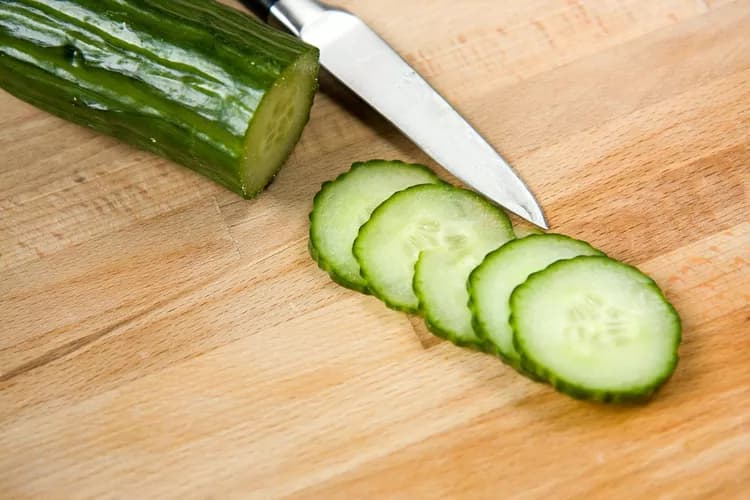The Cucumber (Cucumis sativus) is a widely cultivated plant in the gourd family Cucurbitaceae. China produced at least 60 percent of the global output of cucumbers in 2005, followed by Turkey, Russia, Iran, and the United States. There are three main varieties of cucumber: slicing, pickling, and burpless. Cucumbers grown to eat fresh are called slicing cucumbers. Cucumbers that are preserved are called pickled cucumbers. These tend to be shorter, thicker, less regularly shaped than slicing pickles and have bumpy skin with tiny white or black-dotted spines. Burpless cucumbers are sweeter and have a thinner skin than other varieties of cucumber.
Here are 7 health benefits of the cucumber.
1. Cucumbers are low in calories.
Cucumbers are very filling and satisfy hunger without increasing the calorie count. One cup of cucumbers contains only 16 calories. This low-calorie nutritionally dense food is perfect for weight loss.
2. Cucumbers will not spike your blood sugar levels.
The glycemic index ranks food and drinks based on their blood sugar increase potential. Foods high on the glycemic index like white rice and white bread will break down easily and cause blood sugar and insulin level spikes after meals, which is followed by rapidly dropping blood sugar levels. The sugar from cucumbers is slowly absorbed into the bloodstream, which prevents sugar crashes, sugar cravings, and mood swings.
3. Cucumbers can help improve your bone health.
One cup of cucumber slices contains 22 percent of recommended values of vitamin K. Vitamin K may play a role in bone metabolism by promoting bone growth. Therefore, sufficient consumption of vitamin K makes stronger bones and delay osteoporosis.
4. Cucumbers can you help maintain a healthy blood pressure.
Cucumbers have a good potassium to sodium ratio, which can help battle hypertension. This helps the blood vessels relax and maintains proper blood pressure. Also, a high potassium diet reduces strain on the heart and increases overall cardiovascular health.
5. Cucumbers can help you have a better slumber in the evening.
Cucumbers have been known to help an individual sleep with its high content of magnesium, which is a mineral that is directly linked to improving the quality, duration, and tranquility of sleep. Cucumbers also help regulate the metabolism, to help reduce sleep disorders and the occurrence of insomnia.
6. Cucumbers can assist in the antioxidant defense.
Cucumbers contain manganese, which is an essential cofactor in some enzymes important in antioxidant defenses.
7. Cucumbers are pack with B-vitamin complex.
Cucumbers contain B-vitamin constituents, particularly thiamine and niacin. Thiamin is essential for maintaining proper nerve health and cognitive function. Niacin has been known to increase an individual’s “good” cholesterol and reduce the risk of cardiovascular problems. A deficiency of niacin leads to Pellagra - a disease characterized by diarrhea, dementia, dermatitis, and insomnia, the inability to sleep. The cucumber is also a good source of pantothenic acid, which is an essential vitamin for carbohydrate, protein, and lipid metabolism in the body. Folic acid helps the body to produce healthy red blood cells. It is also necessary for aiding rapid cell division and growth, such as during infancy and pregnancy. A deficiency of folic acid in pregnant women can lead to the birth of underweight infants and may also result in neural tube defects in newborns.
Related Articles
Test Your Knowledge
Asked by users
Related Centers
Related Specialties
Related Physicians
Related Procedures
Related Resources
Join DoveHubs
and connect with fellow professionals


0 Comments
Please log in to post a comment.